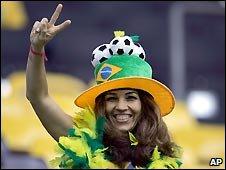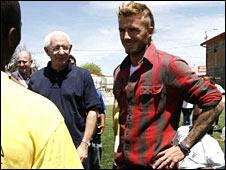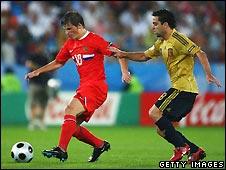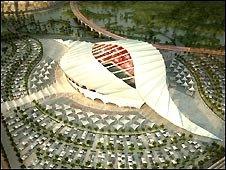World Cup 2018 bidders put economic case to Fifa
- Published

Brazil is hosting the 2014 World Cup
A major landmark for nations hoping to host the World Cup was reached on Friday as official national bid books, including England's, were handed over to global football body Fifa.
The awarding of both the 2018 and 2022 World Cups will be decided by Fifa's executive committee in the Swiss city of Zurich in December.
And that decision will be based largely on the bid documents put forward by the hopeful applicants - who must outline details of venues, training camps, ticketing, government guarantees, and transport.
They also have to provide estimates about how much the World Cup would cost to stage and how much income it would generate.
As well as England, the other European applicants - Holland-Belgium, Russia and Spain-Portugal - are concentrating their fire power on winning the 2018 vote, although all have also applied to host the event in 2022.
Meanwhile, the 2022 event is being contested by Australia, US, Qatar, Japan and South Korea, although the first two are also 2018 bidders.
Educational development
Fifa chief executive Sepp Blatter has been making sure the applicants have been kept on the back foot with a number of cryptic remarks that alternately have given various nations first hope and then, perhaps, doubt.
Recently it has been Russia's turn to have its bid boosted by Mr Blatter, while only a few weeks ago Qatar also found favourable remarks coming their way.
With the next two World Cups in what could be dubbed emerging markets, South Africa and Brazil, England is hoping that Fifa will be looking to host the 2018 tournament in a country where a financial return might seem guaranteed.

David Beckham has been in South Africa as part of the England 2018 bid
"What is interesting about the England bid is that it is almost like a piece of political marketing, rather than social marketing," says Professor Simon Chadwick, chair at Coventry University Centre for the International Business of Sport.
"They are trying to sell it as a good place to host the World Cup, but I think they should focus more on social marketing that ties in more with Fifa's message; highlighting the potential social development of hosting the event.
"An England World Cup bid could be highlighting the work it can do in terms of, for example, educational development programmes in Africa or Asia."
Professor Chadwick says that Fifa creates its own business programmes around the World Cup, and that the England 2018 team should "not be talking about hosting the game as a business opportunity".
"As part of the global football movement, they should be stressing the social side more, I feel - that is what these guys who decide the host county will want to hear," he adds.
'New market'
Russia has spent a lot of time, money and effort in highlighting its bid among the UK media.

Russia (in red) and Spain are both keen to host the 2018 event
And some commentators have speculated that Fifa might like the fact that to get things done in Russia they may only have to deal with Russian President Dmitry Medvedev and Prime Minister Vladimir Putin rather than a plethora of officials.
"In terms of a new market, resources potentially available, and ease of getting things done, I can see why Russia may be attractive to Fifa," says Professor Chadwick.
"But there are issues about the size of the country and logistics. Moving around the country is not easy.
"Also, their way of doing business may not sit comfortably with some companies or organisations."
Stadium issues
The other leading European contender for 2018 is considered to be the joint application from Spain and Portugal, although again Mr Blatter has blown hot and cold on joint bids.
"There is still a great deal of fallout about what to do with many of the stadiums that Portugal built for Euro 2004," explains Professor Chadwick.
"They are struggling to pay for them and there are suggestions to knock them down and sell the land for development as a way of paying for the stadiums.
"So, there was almost an obligation for them to bid in order to get use out of these new stadiums."
The Spanish football world is highly political, and riven by debt, regional tussles, and battles between the two big clubs of Barcelona and Real Madrid, he continues.
Professor Chadwick also says there are political issues to consider when looking at the joint Holland-Belgium bid, with the administrative stability in the latter a matter that has to be addressed.
However, he says that the stadiums and transport infrastructure in Holland are impressive, but match venues in both countries would need to be made larger or built from scratch.
'Good reputation'
While much of the focus in the UK is on who wins the 2018 bid, there is no less a battle to secure the 2022 competition.
Both Qatar and Australia have won some high level publicity for their bids in the past six months.
"Australia has a very good reputation for organisation and hosting major sporting events, " says Professor Chadwick.

Qatar's stadiums will have to deal with heat issues for players and fans
"There is also strong public support, and there are many different national communities in Australia, such as Croatians and Greeks, who would really engage with the World Cup.
"But I see difficulties in terms of distance between cities, and also issues about time zones; how to play games so that they are shown at convenient times in Western Europe."
In Qatar, there are different issues, mainly around how to play games in the hot climate and how to host the Western sporting fan culture, which is in many ways different from the culture in the Middle East.
"However, I have to say that from a Fifa perspective and in terms of current global trends, I think it is a very seductive bid," says Professor Chadwick.
"It ticks a number of boxes for Fifa, is attractive to clubs in Europe, and not too far for the fans from places like Japan and South Korea.
'Political compromise'
Meanwhile, Professor Chadwick feels that for the USA to get the World Cup again, after what would be 28 years since they hosted it in 1994, would be of "questionable value to Fifa in terms of spreading soccer in the country".
Japan and South Korea have submitted single bids after jointly hosting the event in 2002. Professor Chadwick says this "was a political compromise" as both countries have the facilities and organisation to host successful tournaments, but that their best role may be as "backup hosts in case there are problems with the first choice for 2022".
Whatever decisions are made between now and December with regards to 2018 and 2022, no-one can deny that with country visits by Fifa to come during the summer, the bid process is entering a critical phase.